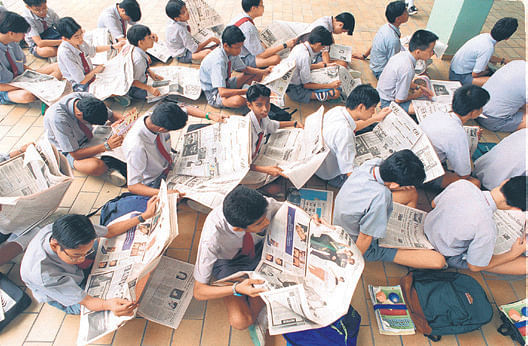THE STORY BEHIND one of The Straits Times' greatest scoops is a story in itself.
As he stood in the immigration line at Jakarta airport, the unassuming man probably attracted scant attention. After all, Mr Wee Kim Wee was not every man's idea of the flashy, big-scoop journalist.
That changed when his name was called out over the public announcement system and he was ushered in. Mr Wee reminisced about it years later, after he became a diplomat and then one of Singapore's most beloved presidents.
"I was escorted into (Indonesia) without immigration delay," he later recalled. "I am sure the onlookers were thinking, 'What is this enemy doing here?"
It was 1966. Singapore, nine months into its journey as a new nation, was yet to be officially recognised by Indonesia. Along with Malaysia, it had been at the receiving end of Indonesia's violent Konfrontasi policy for three years. Sukarno, Indonesia's first president, saw the formation of the Federation of Malaysia in 1963 as Britain's attempt to perpetuate its colonial rule in South-east Asia. He sent armed raiders, infiltrators and saboteurs to destabilise life in the federation, of which Singapore was a part. Diplomatic and economic relations, going back centuries, were severed.
No one from Malaysia or Singapore was allowed to enter Indonesia. Mr Wee's presence at Jakarta airport that day was, in short, an aberration.
After Mr Wee, then the deputy editor of The Straits Times, was whisked away from the immigration queue, he was granted an interview with the enigmatic and powerful new leader of Indonesia.
It got better. Lieutenant-General Suharto, who had confined then President Sukarno to a palace in Bogor after a failed communist coup in 1965, made the dramatic announcement that Indonesia was ready for peace. "Peace: The sooner, the better," declared Suharto in that interview, which was splashed on the front page of The Straits Times on May 2, 1966.
This was the first time the de facto leader of Indonesia had indicated that he was ready to turn the page on Konfrontasi.
True to character, Mr Wee claimed no special credit for a story that changed the course of South-east Asia. The veteran newsman ascribed it to just plain luck. During a layover in Bangkok on his way back from London, he had chanced to meet Indonesia's former consul-general in Singapore. His friendliness encouraged Mr Wee to ask if he could get a visa to visit Jakarta.
To his surprise, the diplomat was agreeable, but on the condition that he travel from a third country. Not long afterwards, Mr Wee was queuing up at Jakarta airport.
By this time, Mr Wee was rather known for his penchant for being in the right place at the right time. And he seemed to court danger. In late 1960, he rushed from Copenhagen, where he was on holiday, to civil war-torn Congo, where Malayan troops were suddenly sent to help United Nations peacekeeping operations.
How he made it into that newly-independent territory on short notice, short on money, with no hotel room or even a visa, is the stuff of newsroom legend. As are his vivid stories of the war, delivered over cable and managing to beat the news relayed by military channels. Mr Wee died in 2005, at age 89.
The Suharto interview made headlines the world over and, less than a month later, Konfrontasi was over. However, the chapter was far from closed. It took seven more years for real trust between Singapore and Indonesia to develop. This was helped by a small but significant gesture, witnessed by another Straits Times journalist.
MACDONALD HOUSE BOMBING
Mr Cheong Yip Seng, who was to become the newspaper's editor for eight years until 1987 and its editor-in-chief for nearly two decades, was barely two years into the job when a bomb went off at the tallest building in Orchard Road.
It had been planted on the mezzanine floor of the nine-storey MacDonald House, just over a kilometre away from the Istana, the office and residence of the President of Singapore.
"I was a rookie, barely two years into the job," said Mr Cheong, 72, now retired. "But my colleagues and I were pitchforked, with barely any journalistic experience, into covering a story that was basically a struggle for Singapore's future."
DANGEROUS TIMES: KONFRONTASI continued...

1977
PRESS LAWS
Changes to the press laws are made, preventing any party from holding more than 3 per cent of a newspaper's ordinary shares.
The questions of how to improve editorial standards and contribute to the nation-building process, while preserving the paper's integrity, emerge as key concerns for The Straits Times.
Motivated by sharp criticism from government leaders, the board decides that the Straits Times should dene an editorial policy that would promote national development.
The newspaper states its objectives are "to inform, to educate, to activate and to entertain". To activate, a new concept for the newspaper, means "explaining, questioning and where necessary criticising government policies and other developments of public interest"; helping to identify and seek solutions to national as well as local community problems; providing a forum for the exchange of views and reader responses; and protecting the "Singaporean point of view and helping to foster our national identity".

